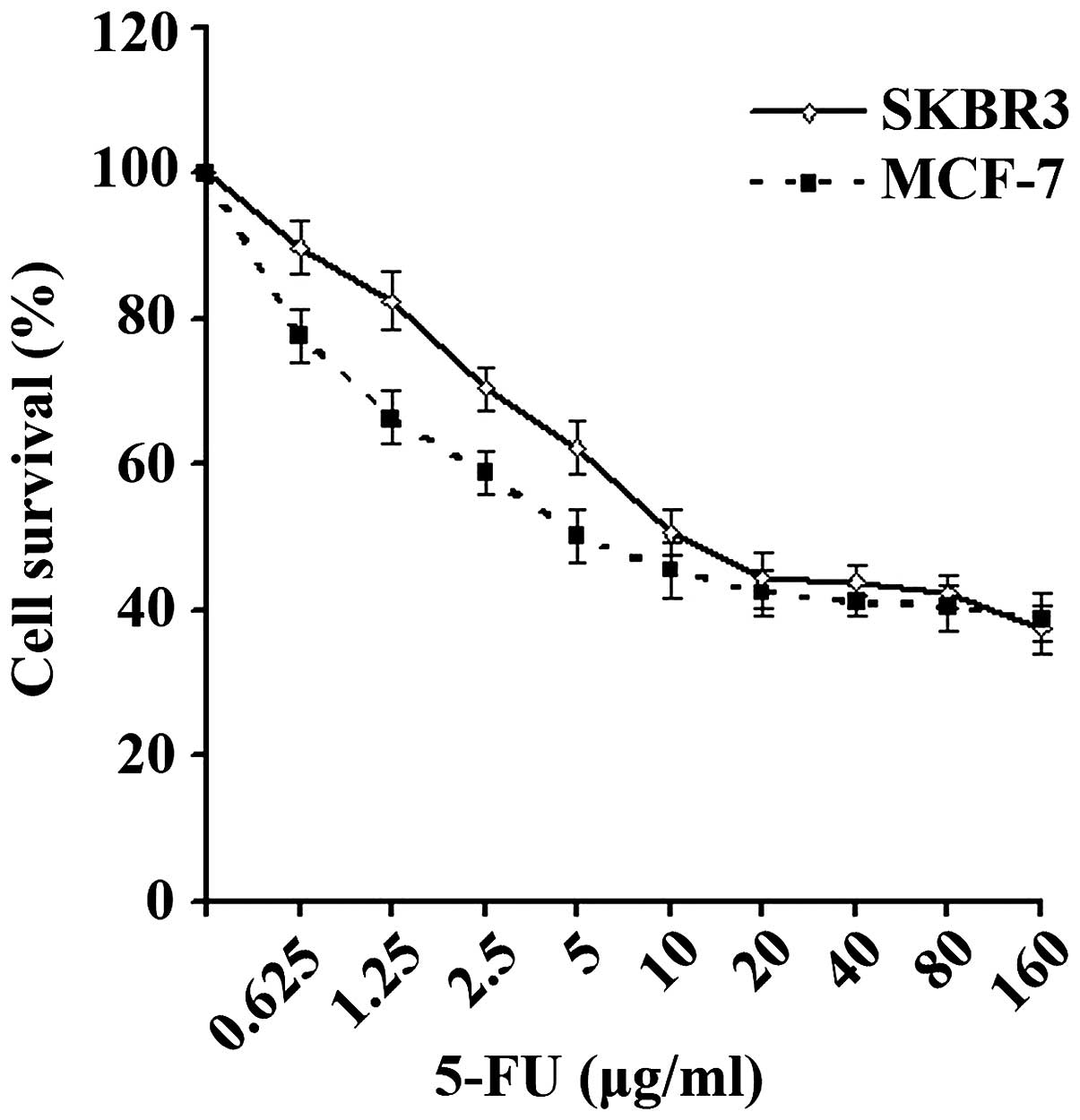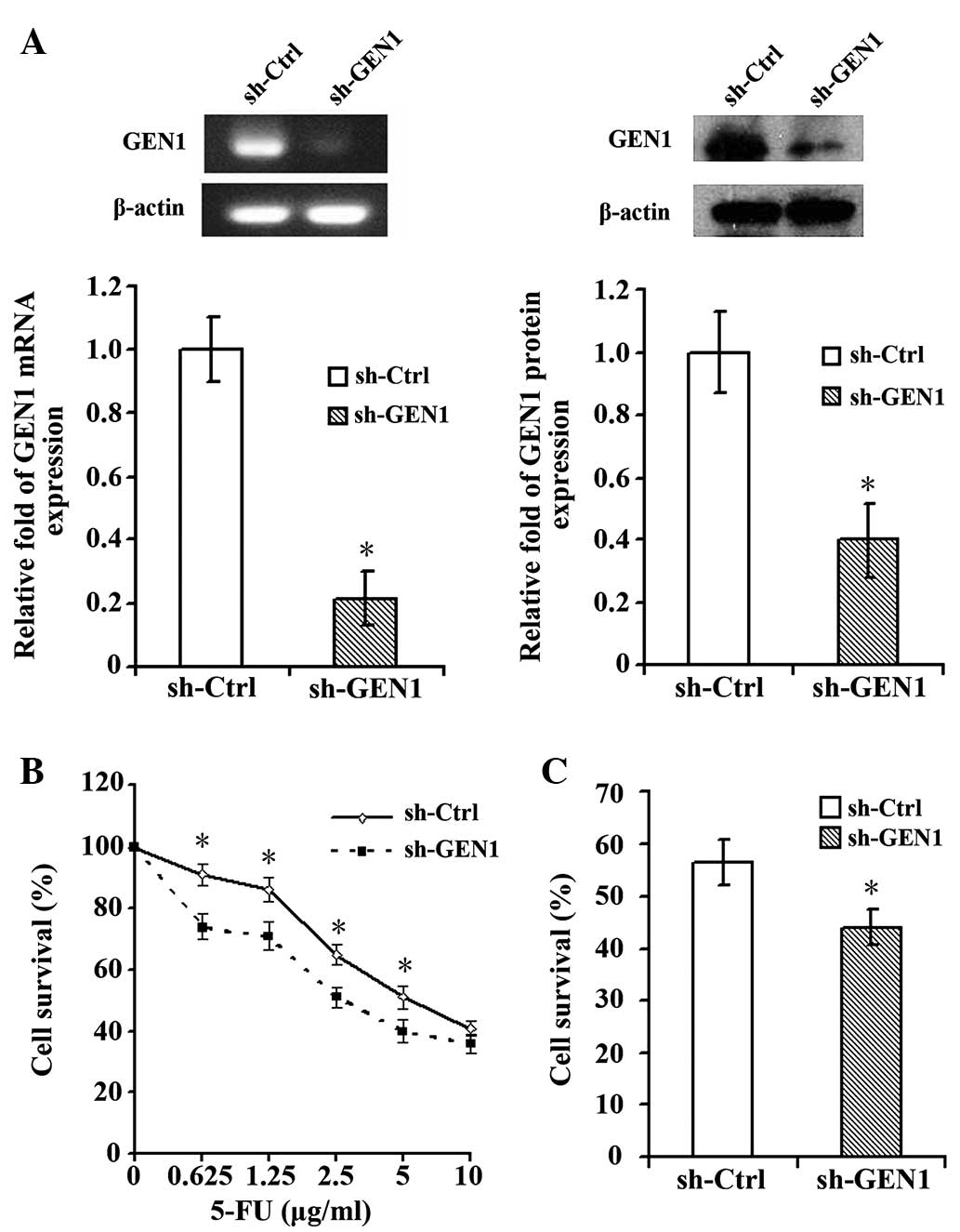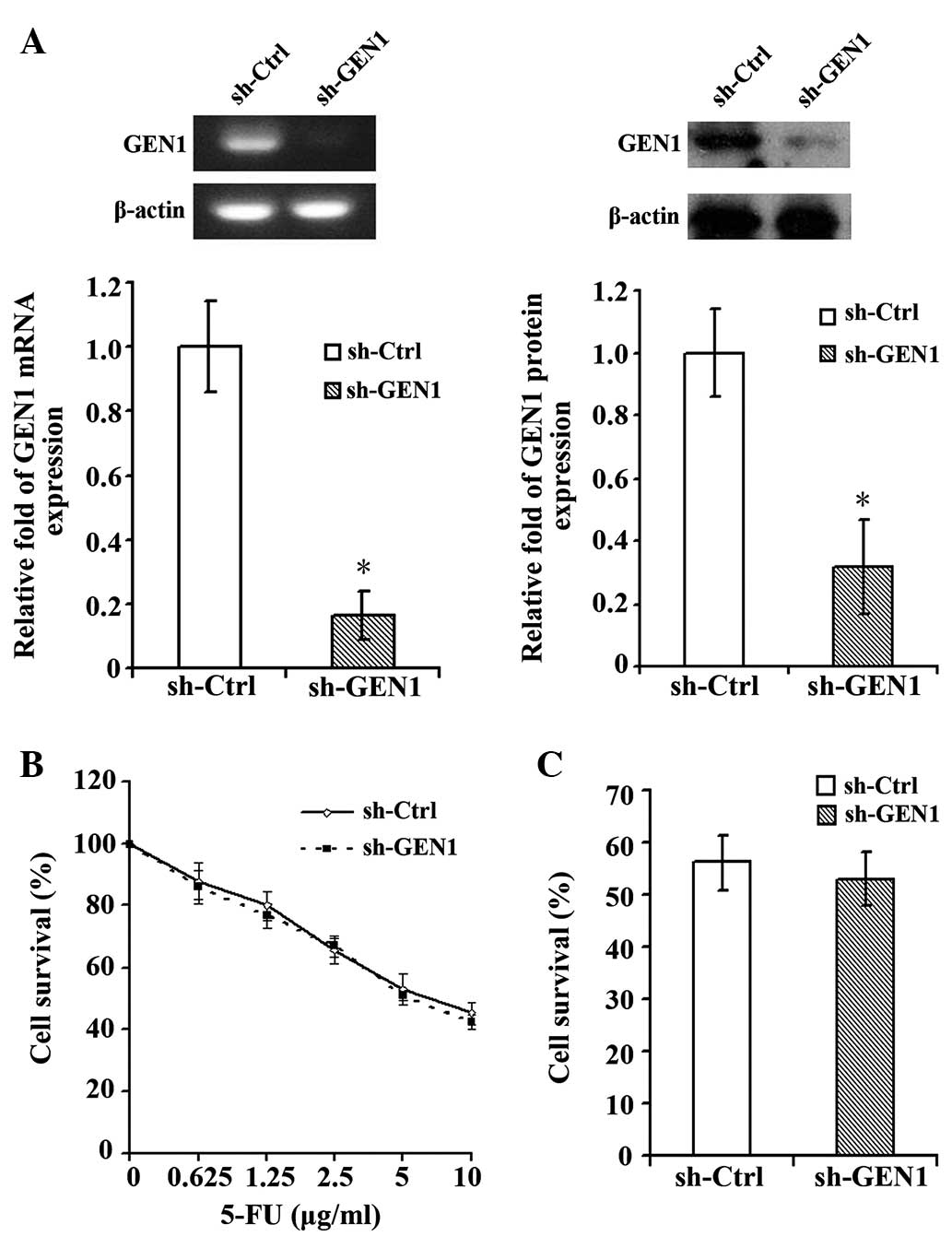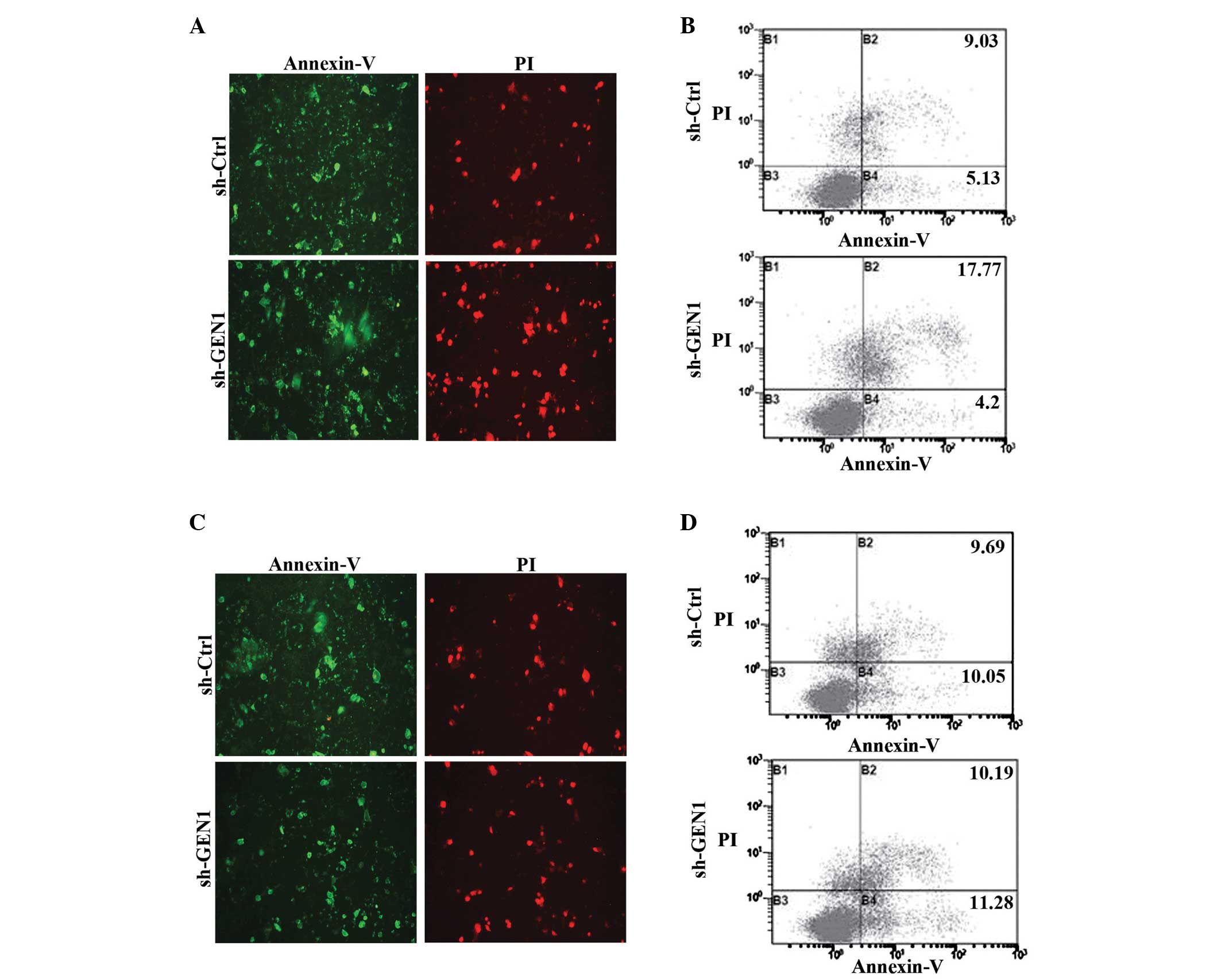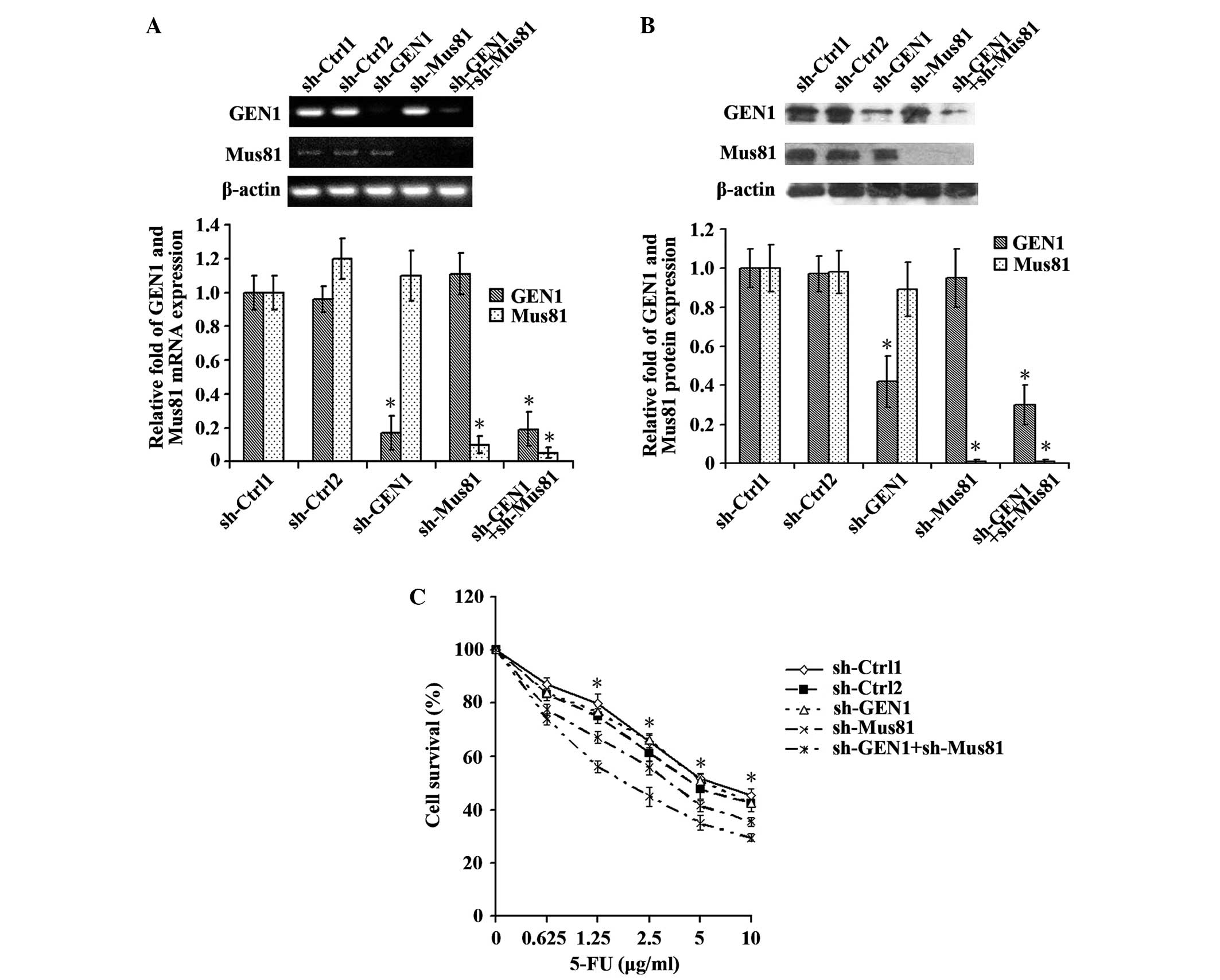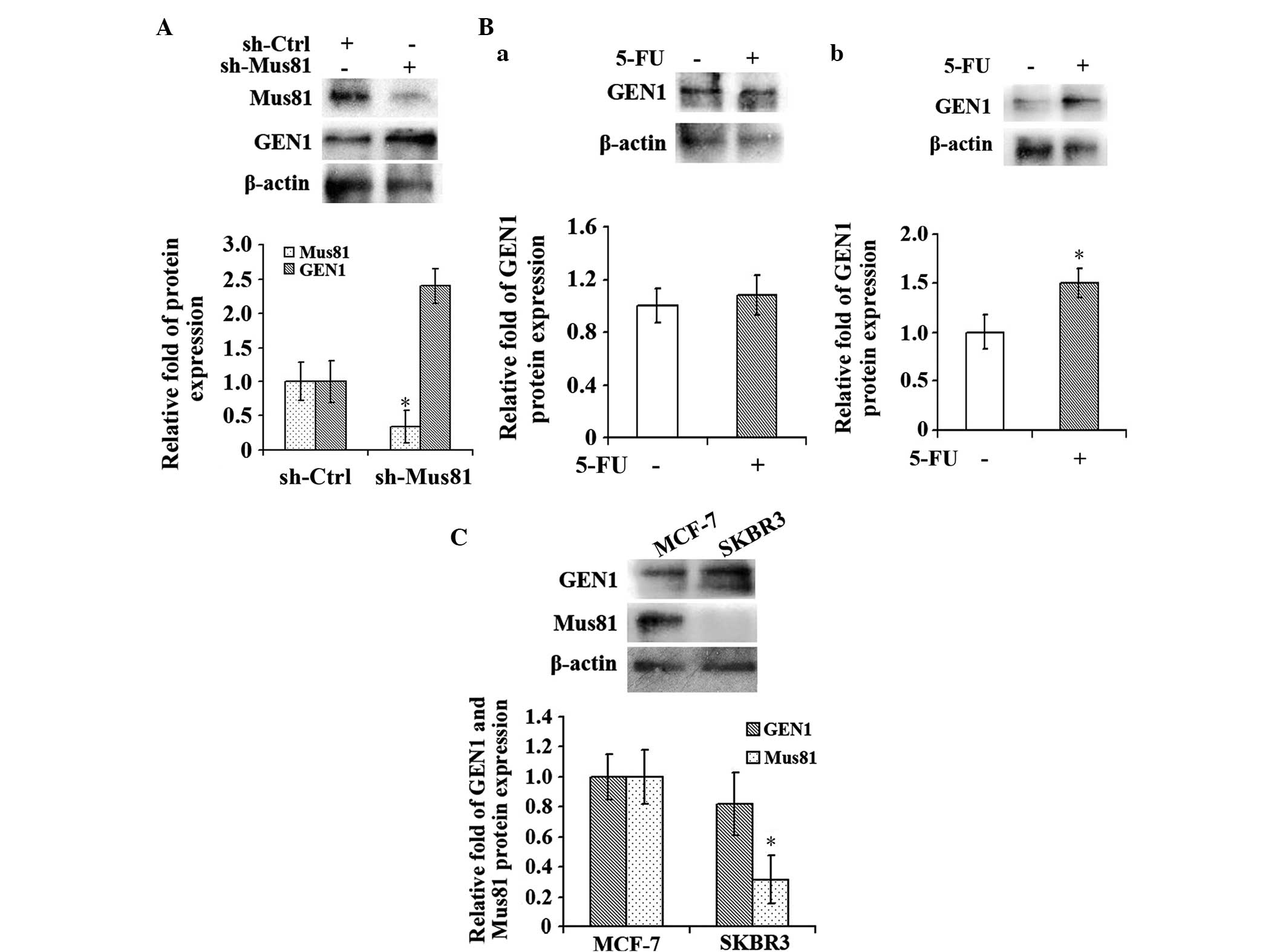|
1
|
Torre LA, Bray F, Siegel RL, Ferlay J,
Lortet-Tieulent J and Jemal A: Global cancer statistics, 2012. CA
Cancer J Clin. 65:87–108. 2015. View Article : Google Scholar : PubMed/NCBI
|
|
2
|
Kuczynski EA, Sargent DJ, Grothey A and
Kerbel RS: Drug rechallenge and treatment beyond progression -
implications for drug resistance. Nat Rev Clin Oncol. 10:571–587.
2013. View Article : Google Scholar : PubMed/NCBI
|
|
3
|
Furukawa T, Kimura S, Ishibashi T, Mori Y,
Hashimoto J and Sakaguchi K: OsSEND-1: A new RAD2 nuclease family
member in higher plants. Plant Mol Biol. 51:59–70. 2003. View Article : Google Scholar : PubMed/NCBI
|
|
4
|
Kanai Y, Ishikawa G, Takeuchi R, Ruike T,
Nakamura R, Ihara A, Ohashi T, Takata K, Kimura S and Sakaguchi K:
DmGEN shows a flap endonuclease activity, cleaving the blocked-flap
structure and model replication fork. FEBS J. 274:3914–3927. 2007.
View Article : Google Scholar : PubMed/NCBI
|
|
5
|
Muñoz-Galván S, Tous C, Blanco MG,
Schwartz EK, Ehmsen KT, West SC, Heyer WD and Aguilera A: Distinct
roles of Mus81, Yen1, Slx1-Slx4 and Rad1 nucleases in the repair of
replication-born double-strand breaks by sister chromatid exchange.
Mol Cell Biol. 32:1592–1603. 2012. View Article : Google Scholar : PubMed/NCBI
|
|
6
|
Agmon N, Yovel M, Harari Y, Liefshitz B
and Kupiec M: The role of Holliday junction resolvases in the
repair of spontaneous and induced DNA damage. Nucleic Acids Res.
39:7009–7019. 2011. View Article : Google Scholar : PubMed/NCBI
|
|
7
|
Ip SC, Rass U, Blanco MG, Flynn HR, Skehel
JM and West SC: Identification of Holliday junction resolvases from
humans and yeast. Nature. 456:357–361. 2008. View Article : Google Scholar : PubMed/NCBI
|
|
8
|
Ashton TM, Mankouri HW, Heidenblut A,
McHugh PJ and Hickson ID: Pathways for Holliday junction processing
during homologous recombination in saccharomyces cerevisiae. Mol
Cell Biol. 31:1921–1933. 2011. View Article : Google Scholar : PubMed/NCBI
|
|
9
|
Machwe A, Karale R, Xu X, Liu Y and Orren
DK: The Werner and Bloom syndrome proteins help resolve replication
blockage by converting (regressed) holliday junctions to functional
replication forks. Biochemistry. 50:6774–6788. 2011. View Article : Google Scholar : PubMed/NCBI
|
|
10
|
Saito TT, Mohideen F, Meyer K, Harper JW
and Colaiácovo MP: SLX-1 is required for maintaining genomic
integrity and promoting meiotic noncrossovers in the Caenorhabditis
elegans germline. PLoS Genet. 8:e10028882012. View Article : Google Scholar : PubMed/NCBI
|
|
11
|
Andersen SL, Kuo HK, Savukoski D, Brodsky
MH and Sekelsky J: Three structure-selective endonucleases are
essential in the absence of BLM helicase in Drosophila. PLoS
Genet. 7:e10023152011. View Article : Google Scholar : PubMed/NCBI
|
|
12
|
Svendsen JM, Smogorzewska A, Sowa ME,
O'Connell BC, Gygi SP, Elledge SJ and Harper JW: Mammalian
BTBD12/SLX4 assembles a Holliday junction resolvase and is required
for DNA repair. Cell. 138:63–77. 2009. View Article : Google Scholar : PubMed/NCBI
|
|
13
|
Qian Y, Liu Y, Yan Q, Lv J, Ni X, Wu Y and
Dong X: Inhibition of Mus81 by siRNA enhances sensitivity to 5-FU
in breast carcinoma cell lines. Onco Targets Ther. 7:1883–1890.
2014. View Article : Google Scholar : PubMed/NCBI
|
|
14
|
Vizeacoumar FJ, Arnold R, Vizeacoumar FS,
Chandrashekhar M, Buzina A, Young JT, Kwan JH, Sayad A, Mero P,
Lawo S, et al: A negative genetic interaction map in isogenic
cancer cell lines reveals cancer cell vulnerabilities. Mol Syst
Biol. 9:6962013. View Article : Google Scholar : PubMed/NCBI
|
|
15
|
Ho CK, Mazón G, Lam AF and Symington LS:
Mus81 and Yen1 promote reciprocal exchange during mitotic
recombination to maintain genome integrity in budding yeast. Mol
Cell. 40:988–1000. 2010. View Article : Google Scholar : PubMed/NCBI
|
|
16
|
Wechsler T, Newman S and West SC: Aberrant
chromosome morphology in human cells defective for Holliday
junction resolution. Nature. 471:642–646. 2011. View Article : Google Scholar : PubMed/NCBI
|
|
17
|
Rass U, Compton SA, Matos J, Singleton MR,
Ip SC, Blanco MG, Griffith JD and West SC: Mechanism of Holliday
junction resolution by the human GEN1 protein. Genes Dev.
24:1559–1569. 2010. View Article : Google Scholar : PubMed/NCBI
|
|
18
|
Gao M, Rendtlew Danielsen J, Wei LZ, Zhou
DP, Xu Q, Li MM, Wang ZQ, Tong WM and Yang YG: A novel role of
human holliday junction resolvase GEN1 in the maintenance of
centrosome integrity. PLoS One. 7:e496872012. View Article : Google Scholar : PubMed/NCBI
|
|
19
|
Bailly AP, Freeman A, Hall J, Déclais AC,
Alpi A, Lilley DM, Ahmed S and Gartner A: The caenorhabditis
elegans homolog of Gen1/Yen1 resolvases links DNA damage signaling
to DNA double-strand break repair. PLoS Genet. 6:e10010252010.
View Article : Google Scholar : PubMed/NCBI
|
|
20
|
Tay YD and Wu L: Overlapping roles for
Yen1 and Mus81 in cellular Holliday junction processing. J Biol
Chem. 285:11427–11432. 2010. View Article : Google Scholar : PubMed/NCBI
|
|
21
|
Górecka KM, Komorowska W and Nowotny M:
Crystal structure of RuvC resolvase in complex with Holliday
junction substrate. Nucleic Acids Res. 41:9945–9955. 2013.
View Article : Google Scholar : PubMed/NCBI
|
|
22
|
Holliday R: A mechanism for gene
conversion in fungi. Genet Res. 5:282–304. 1964. View Article : Google Scholar
|
|
23
|
Tetu SG, Johnson DA, Varkey D, Phillippy
K, Stuart RK, Dupont CL, Hassan KA, Palenik B and Paulsen IT:
Impact of DNA damaging agents on genome-wide transcriptional
profiles in two marine Synechococcus species. Front Microbiol.
16:2322013.
|
|
24
|
Lorenz A, West SC and Whitby MC: The human
Holliday junction resolvase GEN1 rescues the meiotic phenotype of a
Schizosaccharomyces pombe mus81 mutant. Nucleic Acids Res.
38:1866–1873. 2010. View Article : Google Scholar : PubMed/NCBI
|
|
25
|
Mankouri HW, Ashton TM and Hickson ID:
Holliday junction-containing DNA structures persist in cells
lacking Sgs1 or Top3 following exposure to DNA damage. Proc Natl
Acad Sci USA. 108:4944–4949. 2011. View Article : Google Scholar : PubMed/NCBI
|















